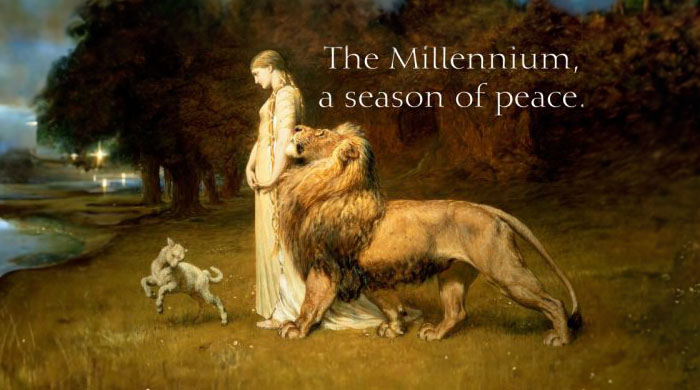Isaiah 65:17 & 66:22
For, behold, I create new heavens and a new earth:
and the former shall not be remembered, nor come into mind...
For as the new heavens and the new earth, which I will make, shall remain before Me,
saith the Lord, so shall your seed and your name remain.
In context, we learn that in this blessed state, men will plan and build (Isa 65:21-22). They will labor. There will be wolves and lambs Isa 65:25). There will be serpents. And there will be sin and death. Those that transgress will be judged daily, and their carcasses will be burned and eaten by worms in the valley of Tophet (Isa 66:24).
This clearly shows that this is about The Millennium. It is the age to which Israel was looking and of which Isaiah prophesied.
But how about the new heavens and new earth? How does this happen? In Eden, there was a firmament and earth under which there was peace among animals and man could live long. This was altered during the fall and expulsion from Eden. Then thorns and thistles began to grow. But still, there was a very long life and ideal conditions for living. At the flood, all that changed, for there was no longer a cloudless sky and watering of the earth by mists. There were winds and rain and the rainbow. These conditions restored (the days be shortened; see Matthew 24:22 and Revelation 8:12) make it like a new heavens and earth for man to dwell in. And after the millennium, there will be a better condition as in Eden.
Nevertheless, we, according to His promise, look for new heavens and a new earth, wherein dwelleth righteousness (2 Peter 3:13).
We see here something new. In this realm will dwell righteousness. That is not entirely true of The Millennium. So, this is not the same as the quotations in Isaiah as above. And this comes to pass after the present heavens and earth are burned up. There is nothing like that preceding the millennium. So, we cannot for a moment equate the passage in Peter with that in Isaiah. They are about two different events.
Note that the above is the result of a promise. So where do we find that promise? It is not in Isaiah 65 or 66.
And I saw a new heaven and a new earth: for the first (former, the one we live in now) heaven and the first earth were passed away; and there was no more sea (Revelation 21:1). Here is our answer. Paul had written 2 Corinthians a few years before Peter wrote his Epistles. In 2 Corinthians 12:1-4, Paul tells of how he, 14 years before, had seen the new heaven and the new earth when he was caught up (should be away) to that future time in a vision and saw the Revelation of Jesus Christ. Paul tells us The Lord made that vision not lawful for him to utter or write, for it was given unto John to write Revelation. So here is the promise Peter is referring to happening at the end of the one thousand years.

